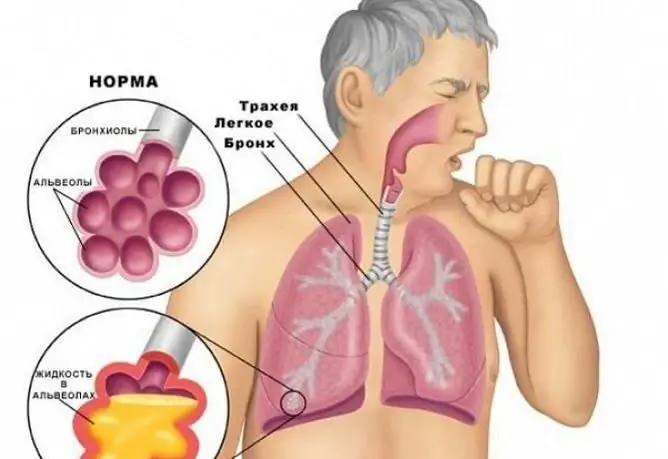- Author Rachel Wainwright wainwright@abchealthonline.com.
- Public 2023-12-15 07:39.
- Last modified 2025-11-02 20:14.
Herbion primrose syrup
Herbion primrose syrup: instructions for use and reviews
- 1. Release form and composition
- 2. Pharmacological properties
- 3. Indications for use
- 4. Contraindications
- 5. Method of application and dosage
- 6. Side effects
- 7. Overdose
- 8. Special instructions
- 9. Application during pregnancy and lactation
- 10. Use in childhood
- 11. Drug interactions
- 12. Analogs
- 13. Terms and conditions of storage
- 14. Terms of dispensing from pharmacies
- 15. Reviews
- 16. Price in pharmacies
Latin name: Herbion cowslip syrup
ATX code: R05CA10
Active ingredient: primrose root extract (Primula veris L., f. Primulaceae) + thyme grass extract (Thynras vulganis L., f. Lamiaceae)
Manufacturer: KRKA (Slovenia)
Description and photo update: 2019-26-08
Prices in pharmacies: from 264 rubles.
Buy

Herbion primrose syrup is a combined herbal preparation with an expectorant effect, has antimicrobial and anti-inflammatory properties.
Release form and composition
Dosage form - syrup: brown liquid, presence of opalescence is allowed, has a specific odor (150 ml each in a dark glass bottle, 1 bottle in a cardboard box complete with a dosing spoon).
5 ml contains:
- active substance: liquid extract of spring primrose roots - 1.03 g [extractant of primrose roots (Primula veris L., f. Primulaceae) and purified water, prepared in a ratio of 1: 2-4.6, yields 3.3 parts of the extract at the exit], liquid extract of common thyme herb - 2.06 g [extractant of thyme herb (Thymus vulgaris L., f. Lamiaceae) and purified water, prepared in a ratio of 1: 3.3, yields 3.3 parts of the extract at the output];
- auxiliary components: levomenthol, sucrose, methyl parahydroxybenzoate (E218).
Pharmacological properties
Pharmacodynamics
Herbion primrose syrup has an expectorant, anti-inflammatory and antimicrobial effect.
Due to the use of the drug, the viscosity of sputum decreases, which improves its discharge.
Indications for use
The syrup is prescribed as an expectorant as part of complex therapy: bronchitis, tracheobronchitis, tracheitis and other inflammatory diseases of the respiratory tract, accompanied by a cough with difficult sputum discharge.
Herbion primrose syrup is also used for dry cough accompanying acute respiratory diseases.
Contraindications
- diabetes;
- syndrome of glucose-galactose malabsorption, congenital deficiency of sucrase or isomaltase, lactose or fructose intolerance;
- bronchial asthma;
- period of pregnancy;
- breast-feeding;
- age up to 2 years;
- hypersensitivity to the components of the drug or an established intolerance to plants of the family Ivory and primroses.
The drug is not prescribed for children with acute obstructive laryngitis (croup).
Instructions for the use of Herbion primrose syrup: method and dosage
The syrup is taken orally after a meal, washed down with warm water in sufficient quantity.
Shake the contents of the bottle before each use.
1 scoop contains 5 ml of syrup.
The recommended dosage has age restrictions:
- adults: 15 ml 3-4 times a day;
- patients 14-18 years old: 10 ml 3-4 times a day;
- children 5-14 years old: 5 ml 3 times a day;
- children 2-5 years old: 2.5 ml (1/2 measuring spoon) 3 times a day.
The treatment continues for 14-21 days.
It is possible to extend the period of use or to repeat the course of therapy only on the recommendation of a doctor.
Side effects
- possible: development of allergic reactions;
- rarely: diarrhea, nausea, vomiting.
Overdose
There are no reports of overdose cases.
Possible symptoms: gastrointestinal upset in the form of nausea, vomiting, diarrhea.
Therapy: symptomatic.
special instructions
If symptoms of the development of undesirable effects appear, the drug should be discontinued immediately and consult a doctor.
The content of carbohydrates (sucrose) in 1 scoop of syrup corresponds to 0.316 XE (bread units).
Influence on the ability to drive vehicles and complex mechanisms
The drug does not affect the patient's ability to drive vehicles and work with complex mechanisms.
Application during pregnancy and lactation
According to the instructions, it is not recommended to use Herbion primrose syrup during pregnancy / lactation, since the safety profile of the drug has not been studied.
Pediatric use
Therapy with Herbion primrose syrup is contraindicated in patients under 2 years of age.
The drug is not prescribed for children with acute obstructive laryngitis (croup).
Drug interactions
The combination therapy cannot simultaneously include Herbion primrose syrup and antitussives or drugs that reduce the formation of sputum, since this combination makes it difficult to cough up liquefied sputum.
Analogs
Analogs of the drug Herbion primrose syrup are: Bronchicum, Bronchipret.
Terms and conditions of storage
Keep out of the reach of children.
Store in original packaging at temperatures up to 25 ° C.
Do not refrigerate.
The shelf life is 3 years.
Terms of dispensing from pharmacies
Available without a prescription.
Reviews of Herbione primrose syrup
Most of the reviews about Herbione primrose syrup are positive. They note its high efficiency, rapid development of therapeutic action, natural composition and convenient form of release. The syrup has a pleasant sweet taste and does not contain alcohol. The drug is often used in pediatric practice for coughing accompanied by difficult sputum discharge. Less commonly used Herbion primrose syrup for dry cough.
There are practically no reports of the development of adverse reactions. The cost in most cases is assessed as affordable.
Price for Herbion primrose syrup in pharmacies
The approximate price for Herbion primrose syrup (1 bottle of 150 ml) is 226-309 rubles.
Herbion primrose syrup: prices in online pharmacies
|
Drug name Price Pharmacy |
|
Herbion primrose syrup syrup 150 ml 1 pc. 264 r Buy |
|
Herbion primrose syrup 150ml 271 r Buy |

Maria Kulkes Medical journalist About the author
Education: First Moscow State Medical University named after I. M. Sechenov, specialty "General Medicine".
Information about the drug is generalized, provided for informational purposes only and does not replace the official instructions. Self-medication is hazardous to health!






